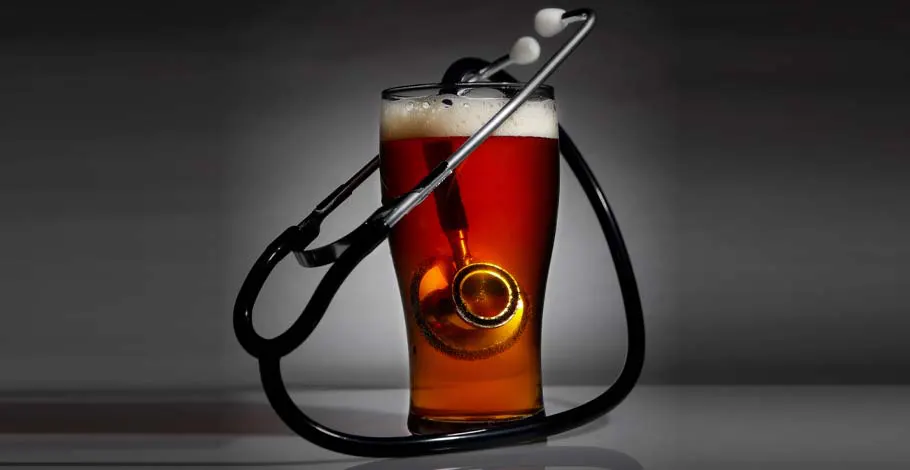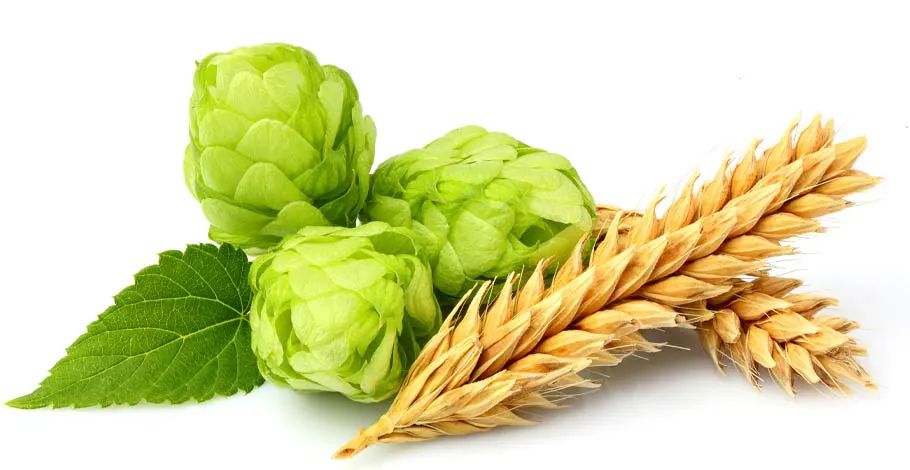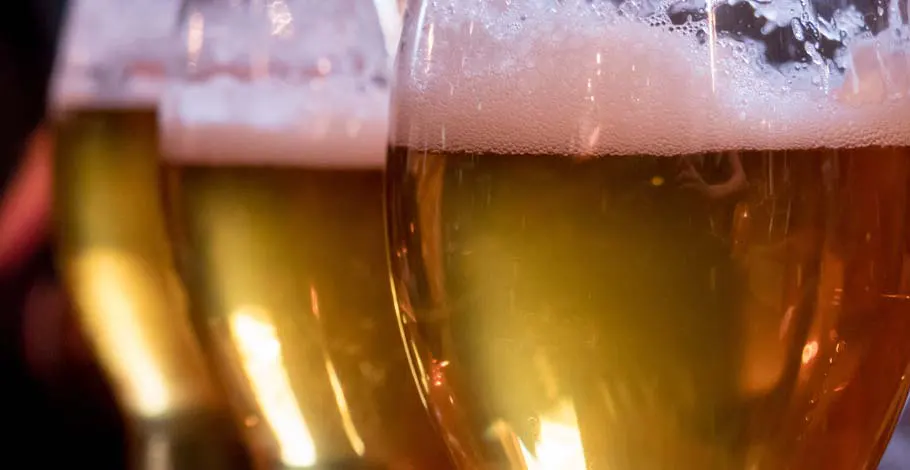In This Review
Beer and its History
Research found Beer is one of the most commonly used alcoholic drinks in the world and it is third most popular drink in the world, right after tea and water[1].

Beer is brewed by the saccharification of starch and fermentation of the resulting sugar. Saccharification is the process where a complex carbohydrate (like starch) is divided into its monosaccharide components.
In simple words, there are three primary methods Beer production : extract brewing, partial mash, and all-grain. All three methods begin with warming water and grain, tossing in hops, and then bringing the blend to a boil. Once that’s done and it is cooled down, yeast is added to either barrel or bottle to let the foam build up. The difference between these methods is in the initial steps of crafting the brew.
Beer has a long history and it belongs to a group of oldest prepared beverages. First traces of beer production date back to 9500 BC, early Neolithic period. It is also recorded in history of ancient civilizations of Egypt and Iraq. Sumer people fermented bread in order to make a pulp which was characterized by the intoxicating effect. They referred to it as a divine drink. Babylonians produced beer too and it is assumed they had about 20 different types of beer. Egyptians buried beer and malt with Pharaohs to offer them some nourishment in the afterlife. Romans drank beer as well. Even though they preferred wine, some parts of the Roman Empire were known for beer consumption.
During the Middle Ages monasteries brewed beer and some monks drank up to 5l of beer per day.
In the year 822AD hops was introduced into beer production and Germany was the first country to use it. Germany was also the first country to implement ingredient regulation with The Reinheitsgebot of 1516, also known as The Purity Law. This law dictated that beer should be made of water, malt, and hops.
It is usually believed that alcoholic beverages can only damage our brain, heart, and other organs. Regular consumption of alcoholic drinks is associated with damage and deterioration of our mind, body, and soul.
However, beer has many health benefits and can improve our overall health in a lot of different ways. This article will discuss health benefits that come with consumption of beer.
Beer Ingredients

Brewing beer requires few ingredients that are considered as a standard for this product. They are:
Barley
– Is the main ingredient of the beer. Barley grains are usually low in proteins and fat, but they are rich in starch. Starch is consisted of sugar molecules and it is grain’s food reserve.
Hops
– Is a plant that can grow in height up to 20m. This plant is consisted of essential oils that offer distinctive flavor to the beer; it serves like a spice in the beer-making industry.
Water
– Beer is made mostly of water. Different regions have water of different mineral composition which affects the flavor of the beer and that is why beers with same ingredients and formula from different regions can taste differently.
Yeast
– Produces flavor compounds and it is responsible for the fermentation of the beer. The function of the yeast is to metabolize sugars which were extracted from grains. This process leads to production of alcohol and carbon dioxide, in other words, it turns wort (liquid that is extracted during the brewing process) into beer.
6 Unusual Health Benefits of Enjoying Beer
As it was mentioned above, beer has numerous health benefits and they are:
1. Prevents Type 2 diabetes
– Moderate consumption of beer is associated with the lower risks of getting diabetes. About 15 different scientific researches have confirmed that beer reduces the risk of suffering from Type 2 diabetes. It is because beer increases insulin sensitivity[2].
2. Protects against gallstones
– Beer can also be good for decreased risk of symptomatic gallstone disease. Additionally, increase in beer consumption is associated with the decreased risk.
3. Boost Immunity
– Alcoholic beverage like Beer when consumed in moderate way has shown positive effects on Immunity and could benefit the gut microbiota[3].
4. Improves brain health
– Scientists proved that, xanthohumol, a flavonoid that is found in beer can improve cognitive function[4].
5. Improves heart health
– People who drink beer have 42% lower risk of getting cardiovascular disease, comparing to people who don’t drink beer. According to one of the research, Beer has protective effects on the cardiovascular system and cancer. Moderate consumption of beer can lower the chances of getting heart attack[5].
6. Boosts creativity and problem-solving skills
– Scientists conducted a study where men who drank beer and men who didn’t had to solve a verbal puzzle while watching the movie at the same time. The result of the study showed that men who drank beer solved problems before men who didn’t drink beer. This leads to a conclusion that beer has a positive effect on our problem-solving abilities[6].
Are all Beers the Same?

Even though beers generally contain same set of ingredients, they are not all the same. In order to get the best out of your beer you should be careful when you are purchasing the product. Some beers contain genetically modified ingredients, while some contain sweeteners, corn syrup, preservatives.
Research found that craft beers have various benefits. These beers are produced in microbreweries which do not mass produce their products. Microbreweries are focused on flavor, quality of the beer, and development of brewing technique. On the other hand, mass produced beers contain questionable ingredients and the companies are more focused on the quantity rather than on quality of the product[7].
When you are about to purchase beer, you should make sure to check:
Alcohol By Volume (ABV): This is the percentage of alcohol in the beer. Most beers have an ABV of 4-6%, but some can be higher or lower.
Ingredients: This will tell what ingredients are in the beer. Most beers are made with barley malt, hops, water, and yeast. However, some beers may also contain other ingredients, such as fruits, spices, or vegetables.
Style: This will tell what type of beer it is. There are many different styles of beer, including pale ale, IPA, stout, and lager.
IBU: This stands for International Bitterness Units. It measures the bitterness of the beer. Generally beers have an IBU of 20-50, but some can be higher or lower.
Serving temperature: This will tell the ideal temperature to serve the beer at. Most beers are best served cold, but some may be better served at room temperature.
Expiration date: This will tell when the beer is no longer safe to drink.
How Much Beer Should I Drink Per Day?
Beer can be healthy and is able to improve our health, boost immunity, and prevent many diseases. However, if you think the more you drink, the healthier you will be, you are wrong. The key to success can be found in moderation.
Moderate drinking was mentioned throughout this article for a reason. If you consume too much beer it will not result in improved health, instead it can harm your health.
According to scientists you should:
1. Be moderate and drink between one and three units per day.
2. Your intake of beer should be consistent, which means if you have one beer today, you shouldn’t have 3 tomorrow.
3. Men can drink up to 21 beers per week, while women can consume 14 during one week.
4. You should stay away from drinking more than 5 beers during a short period of time.
Bottom line is, you should drink between one and three beers during the day and that is it.
Dos and Don’t’s
- DO buy craft beers or other beers which do not contain harmful ingredients.
- DON’T let your beer get too cold. People usually think the colder the beer, the better it is. However, that is wrong. When beer is too cold you can numb your palate and decrease the ability to fully taste all its components. Experts suggest slightly cool off the beer before drinking.
- DON’T store the beer in the light – light can decrease beer’s quality and that is why most companies have darker beer bottles. Additionally, the place you store your beer should be dark and cool.
- DON’T drink beer on an empty stomach – it can change the way your body processes alcohol.
- DO try to be moderate – know when to stop. A few beers are more than enough to help you relax, retain their health benefits without eventually damaging your health.
Conclusion
Beer is one of the most famous drinks in the world. This alcoholic beverage has a lot of health benefits and can prevent some diseases if consummated in moderation.
7 sources
We review published medical research in respected scientific journals to arrive at our conclusions about a product or health topic. This ensures the highest standard of scientific accuracy.
[1] Global status report on alcohol and health 2018: https://www.who.int/publications/i/item/9789241565639[2] Moderate Alcohol Consumption Lowers the Risk of Type 2 Diabetes: A meta-analysis of prospective observational studies: https://diabetesjournals.org/care/article/28/3/719/27797/Moderate-Alcohol-Consumption-Lowers-the-Risk-of
[3] Effects of moderate beer consumption on health: https://pubmed.ncbi.nlm.nih.gov/30351160/
[4] Xanthohumol-induced presynaptic reduction of glutamate release in the rat hippocampus: https://pubmed.ncbi.nlm.nih.gov/26667007/
[5] Wine, beer, alcohol and polyphenols on cardiovascular disease and cancer: https://pubmed.ncbi.nlm.nih.gov/22852062/
[6] Creativity on tap? Effects of alcohol intoxication on creative cognition: https://www.sciencedirect.com/science/article/pii/S1053810016303713
[7] A comprehensive review of the benefits of drinking craft beer: Role of phenolic content in health and possible potential of the alcoholic fraction: https://pubmed.ncbi.nlm.nih.gov/36935850/








 This article changed my life!
This article changed my life! This article was informative.
This article was informative. I have a medical question.
I have a medical question.
 This article contains incorrect information.
This article contains incorrect information. This article doesn’t have the information I’m looking for.
This article doesn’t have the information I’m looking for.